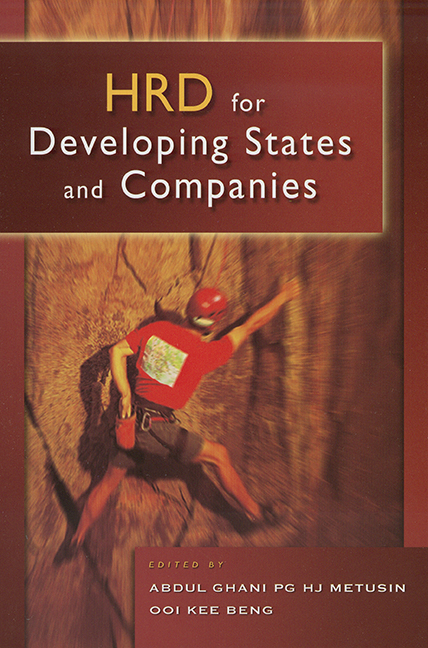Book contents
- Frontmatter
- Contents
- Foreword
- Preface
- Editorial Remarks
- Acknowledgements
- Introduction
- HRD for Statesmen
- HRD Strategies for Companies
- 7 Crafting and Implementing a Strategic HR Programme
- 8 Enhancing Human Capital in the New Economy
- 9 Competency Development for Superior Performance
- 10 Leading with Emotional Intelligence
- 11 Diversity in Work-Life Programmes
- 12 Strategic HR — Making Do or Doing More?
- Competence Development
- Corporate Experiences
- About the Authors
8 - Enhancing Human Capital in the New Economy
from HRD Strategies for Companies
Published online by Cambridge University Press: 21 October 2015
- Frontmatter
- Contents
- Foreword
- Preface
- Editorial Remarks
- Acknowledgements
- Introduction
- HRD for Statesmen
- HRD Strategies for Companies
- 7 Crafting and Implementing a Strategic HR Programme
- 8 Enhancing Human Capital in the New Economy
- 9 Competency Development for Superior Performance
- 10 Leading with Emotional Intelligence
- 11 Diversity in Work-Life Programmes
- 12 Strategic HR — Making Do or Doing More?
- Competence Development
- Corporate Experiences
- About the Authors
Summary
Change is currently occurring at an unprecedented rate. The very speed of change in itself has tremendous implications not only for the business world, but also for the management of resources, especially human resources. Nowadays, business organizations are constantly hearing “more, better and faster with less” as the demand of the day. Focus should therefore be put on the link between rapid advances in technology and the way information and knowledge can both be harnessed and rendered obsolete in a short time.
Due to changes in the world environment, certain common trends in human resources are noticeable. Large companies, including government and big organizations, have to react quickly to stay competitive in today'sworld. The larger the company, the more difficult it is to be agile. There is also a growing need to manage the increased access to information through the Internet, since more information is available to everyone today. Access to information in turn changes the culture and diversity of work. Ultimately, as a result of this, there is an increasing need for continuous learning on everyone'spart, if they are to remain competitive and relevant in today'sburgeoning economy.
The development of human resources needs to take into account the various forces that are at play in today'sdynamic world. In today'sbusiness reality, we frequently hear about the urge to have more things, to have better versions of them, to attain them at a faster rate, and to get them at lower costs. These are the result of the inevitable changes that are taking place everywhere. Furthermore, it is not just change itself that is the challenge. More importantly, it is the speed at which these changes take place that is making change itself more prominent. “The amount of time to double our knowledge in many fields has gone from being measured by centuries to being measured in months”. Hence, employers and employees alike have to take into account the urgency of remaining relevant in an ever-changing environment. Human resource management thus has to consider addressing people who resist change; more precisely, those who resist being changed.
- Type
- Chapter
- Information
- HRD for Developing States & Companies , pp. 53 - 55Publisher: ISEAS–Yusof Ishak InstitutePrint publication year: 2005



